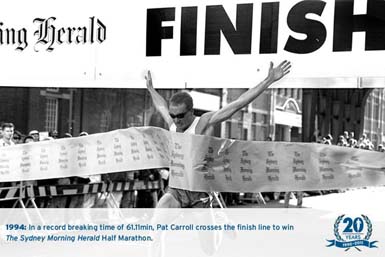Unfortunately, the programs I have are mine, i.e. training routines aimed at my personal goals based on my experience and ability at that particular point in time. It will never match yours because everyone is different.
You could simply Google for a free training program or buy a book that offers some. It's what I did as a novice many years ago. (Regular readers of this blog will know I am currently following a program from a book; I was able to recognize and choose this because of my 16 years of experience as a runner.)
My top recommendation for novice and/or inexperienced runners is to invest in a running coach—not a random personal trainer but someone with a track record in the sport, both as a runner and with guiding runners specifically.
 |
| SMH.com.com.au/PatCaroll.com.au |
I will often recommend people get an online coaching program from Australia's Pat Carroll, who ran a 61:11 half marathon in 1994 and a 2:09:39 marathon in 1995 and guided my running from June 2005 until April 2010. If you think this post sounds like a paid ad, it's not; I simply learned a lot from him and recommend him without any hesitation.
He's knowledgeable, positive, and takes a conservative approach to training; speeding up to a 3:07 marathoner under his guidance, my biggest training week with him never exceeded 90km, if I even ran that.
Most of his sessions aim for time, rather than distance, to ensure you are focused on spending time on your feet, rather than feeling stressed about having to complete a certain distance at a pace that is too fast. There's plenty of speed work too, with two short but challenging sessions a week.
As Carroll says in my book Running Shoes Are a Girl's Best Friend, runners seek his online guidance for three key reasons. “One, to get direction because they have absolutely no idea what to do; two, you get people who want just to be answerable to me to help with their motivation—another reason not to sleep in; and then you have got people who have no problems with motivation but who are goal-driven and want to improve.”
After getting to know the running history, or lack thereof, of each new client, Carroll devises a training program based on their experience and goals. He makes no promises when it comes to results and also warns against coaches who offer guarantees on finishing times, or running a marathon in three months. He recommends anyone seeking out a coach that they make sure this person has experience in running themselves, not necessarily as an elite athlete.
“It’s important that it is someone who has been involved in running, maybe not at the top end but definitely a runner. Because running is such a stressful action to put your body under, you really have to understand and get a feel for where the person is at, their level of development and what they are going to be able to handle without falling apart," Carroll says in Running Shoes Are a Girl's Best Friend.
As most of us are putting the final touches on gifts for Christmas, why don't you invest in your 2012 physical and mental wellbeing by buying yourself a few months worth of training with a reputable coach? You won't regret the investment; Carroll, for example, offers 8-week programs for $105 (Australian). That's excellent value for guidance by one of Australia's best distance runners ever.
It's certainly cheaper and more fun than having to fix a running injury suffered because of inexperience and a lack of knowledge.
As Tim Noakes writes in Lore of Running, "Running injuries have a unique feature: an identifiable and treatable cause. And until that cause is rectified, the conventional approach—the rest, the drugs, the injections, and the surgery—is an expensive waste of time."
More often than not, the cause of injuries is running too much, too often, too soon. Ask any runner. That's why it's worth investing in a training program tailored to you.
No comments:
Post a Comment